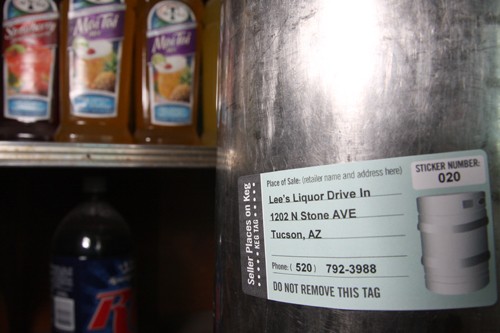The University of Arizona and Tucson police departments are collaborating with local liquor merchants to hold those who provide alcohol to underage drinkers more accountable.
Representatives from the Pima County Board of Supervisors, TPD and the UA gathered in a town hall meeting on June 10 to discuss a new Keg Tagging Program to prevent minors from having someone else purchase alcohol for them.
“”At point of sale, you show them your ID and they confirm you’re of age. Then you fill out a brief little sheet that corresponds with a tag with your name, address, ID type and some information related to that. It’s a 30-second process. They put a tag on the keg that is associated with you as a buyer,”” said David Salafsky, director of Health Promotion and Preventive Services at UA Campus Health.
According to the program’s press release, underage drinking costs the U.S. over $53 billion annually. The Keg Tagging Program will be the first step in the Tucson area collaborators’ goal to cut back on underage and binge drinking in Pima County.
Amy Bass, director of prevention for the Pima County Community Prevention Coalition, said eight out of 13 Tucson liquor merchants are volunteering their involvement in the Keg Tagging Program.
Dan Rodarte, owner of Lee’s Drive-In Liquor, said it was a no-brainer to come on board. He said they already collect all the information required, and the keg tag is just an additional step.
“”Usually you have someone of age who comes in to buy alcohol and provides for the minors. Retailers have no control over this, but with the keg tagging it puts the responsibility back to the purchaser. We do it to cover our butts,”” Rodarte said.
While Rodarte fully supports the program, he also questions the stipulations of possible legislation. He feels that if keg tagging becomes state mandated, the government should help with the cost of the stickers used as tags.
“”Right now it’s not out of our pockets. We count our pennies, nickels and dimes. If we have to start providing the tags, it’s not cost effective,”” Rodarte said.
He said he only makes about $5 on a keg, and if it costs him $1.50 for a sticker, it’s not worth it in the long run.
Many students, however, don’t think a sticker will have much power in the end.
“”This is just going to try to intimidate people. Maybe they’ll think twice before they do something, but they’ll find their way around it,”” said Andrew Vo, 19, a UA pre-pharmacy student.
Pre-nursing and psychology student Taylor Simmons, 19, agrees that kids will find other ways to drink.
“”The person who is responsible for buying could not buy a keg, but something else. It might reduce keg sales, but I don’t think overall it will have the impact they want. It will just force kids to be creative and party somewhere else,”” Simmons said.
According to the federal Alcohol Policy Information System website, as of 2009, 31 states have keg registration legislation.
“”At this point, we are only hitting one little niche of alcohol. If kids want to drink, they’ll do whatever they have to get around laws or their parents. There’s numerous ways how underage drinkers can get alcohol,”” said Allison Jacobs, the Pima County Community Prevention Coalition program assistant. “”We’re trying to get one little niche down and then tackle the rest.””
Jacobs also said that launching this program might set the standard for other Arizona counties.
“”We don’t have the authority to change the law at a local level. The coalition spearheaded this as a pilot project to set the ball in motion and get merchants on board. We are hoping to get legislation to pass a state law that makes it mandatory,”” Bass said.









